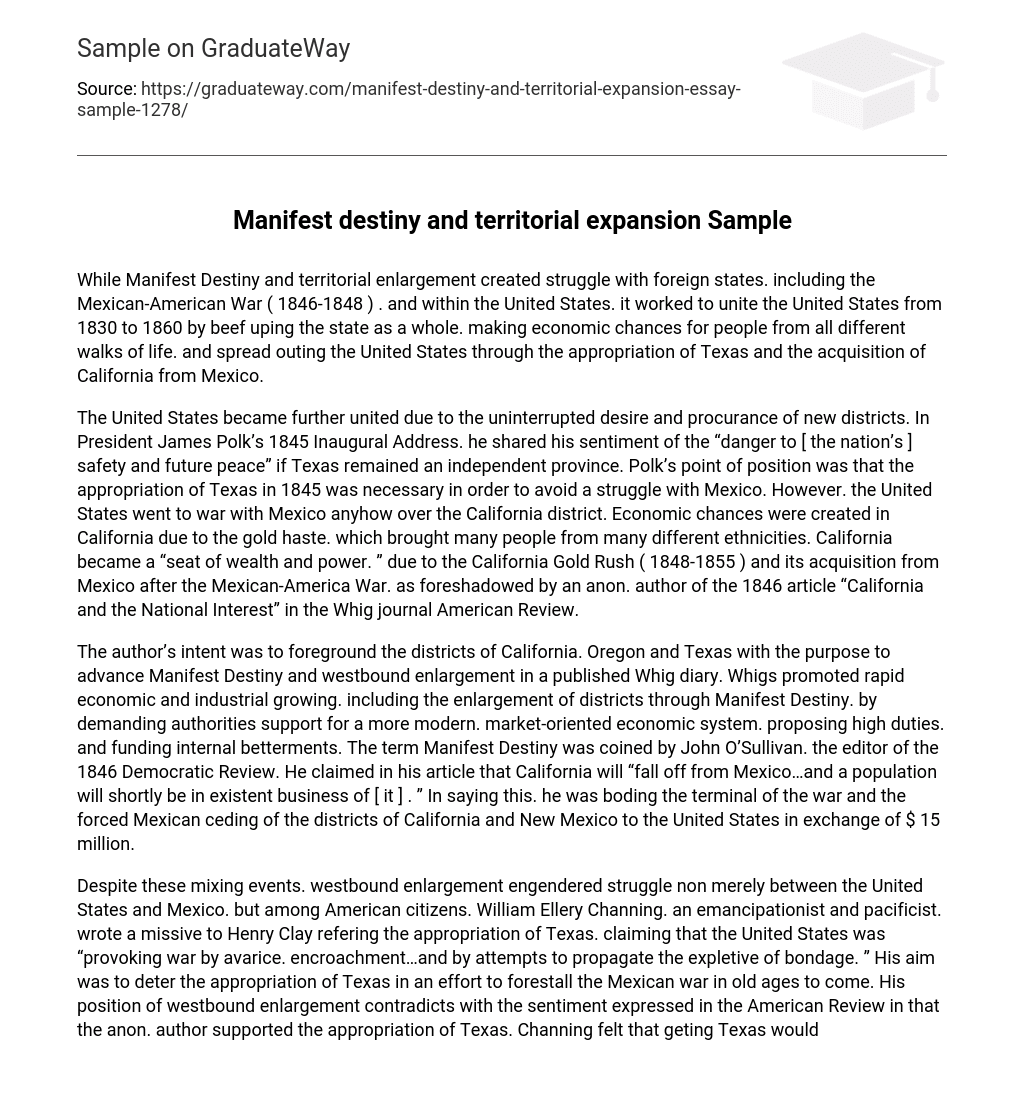While Manifest Destiny and territorial enlargement created struggle with foreign states. including the Mexican-American War ( 1846-1848 ) . and within the United States. it worked to unite the United States from 1830 to 1860 by beef uping the state as a whole. making economic chances for people from all different walks of life. and spread outing the United States through the appropriation of Texas and the acquisition of California from Mexico.
The United States became further united due to the uninterrupted desire and procurance of new districts. In President James Polk’s 1845 Inaugural Address. he shared his sentiment of the “danger to [ the nation’s ] safety and future peace” if Texas remained an independent province. Polk’s point of position was that the appropriation of Texas in 1845 was necessary in order to avoid a struggle with Mexico. However. the United States went to war with Mexico anyhow over the California district. Economic chances were created in California due to the gold haste. which brought many people from many different ethnicities. California became a “seat of wealth and power. ” due to the California Gold Rush ( 1848-1855 ) and its acquisition from Mexico after the Mexican-America War. as foreshadowed by an anon. author of the 1846 article “California and the National Interest” in the Whig journal American Review.
The author’s intent was to foreground the districts of California. Oregon and Texas with the purpose to advance Manifest Destiny and westbound enlargement in a published Whig diary. Whigs promoted rapid economic and industrial growing. including the enlargement of districts through Manifest Destiny. by demanding authorities support for a more modern. market-oriented economic system. proposing high duties. and funding internal betterments. The term Manifest Destiny was coined by John O’Sullivan. the editor of the 1846 Democratic Review. He claimed in his article that California will “fall off from Mexico…and a population will shortly be in existent business of [ it ] . ” In saying this. he was boding the terminal of the war and the forced Mexican ceding of the districts of California and New Mexico to the United States in exchange of $ 15 million.
Despite these mixing events. westbound enlargement engendered struggle non merely between the United States and Mexico. but among American citizens. William Ellery Channing. an emancipationist and pacificist. wrote a missive to Henry Clay refering the appropriation of Texas. claiming that the United States was “provoking war by avarice. encroachment…and by attempts to propagate the expletive of bondage. ” His aim was to deter the appropriation of Texas in an effort to forestall the Mexican war in old ages to come. His position of westbound enlargement contradicts with the sentiment expressed in the American Review in that the anon. author supported the appropriation of Texas. Channing felt that geting Texas would non merely trip struggle with Mexico but would besides make jobs in the United States in respects to slavery.
This issue over the extension of bondage in Texas presaged Bleeding Kansas. a series of violent political confrontations affecting anti-slavery Free Soilers and pro-slavery Southerners that took topographic point in the Kansas Territory between 1854 and 1861. After President Polk was able to obtain Texas from Mexico. he set his mark on the California Territory. Senator Thomas Corwin was able to see that with spread outing districts came war with Mexico and debates over bondage if the United States won. which he argued in his 1847 address to Polk. His point of position was that even if the United States won the war with Mexico and gained ownership of California. there would merely be more struggle in the fatherland on the subject of California being admitted as a slave or free province. He inquiries Polk’s concluding in the nation’s “ [ engagement ] in the [ Mexican War ] ” if merely to make a “civil conflict…over the inquiry of bondage. ”
This issue was subsequently resolved by the Compromise of 1850. which admitted California as a free province. The Compromise was drafted by Henry Clay. a Whig. and Stephen Douglas. a Democrat. Douglas supported the political philosophy of popular sovereignty. or the rule that the province authorities could make up one’s mind the destiny of bondage in their part. Senator Charles Sumner. excessively. felt that westbound enlargement would split the state over the issue of bondage. reasoning in Massachusetts Legislature that the Mexican-American War was “unconstitutionally commenced by the order of the President” and if the state were to obtain the California district it would “strengthen break one’s back power. ” President Lincoln shared the sentiment in his celebrated topographic point declarations that requested President Polk to supply Congress with the exact topographic point upon which blood was spilt on American dirt. as Polk had claimed in 1846 when inquiring Congress to declare war on Mexico. Slavery was a normally debated issue that was associated with Manifest Destiny. which finally led to the Civil War. finally spliting the state. Though westbound enlargement unified the United States temporarily. it merely delayed the inevitable war over bondage and states’ rights.





